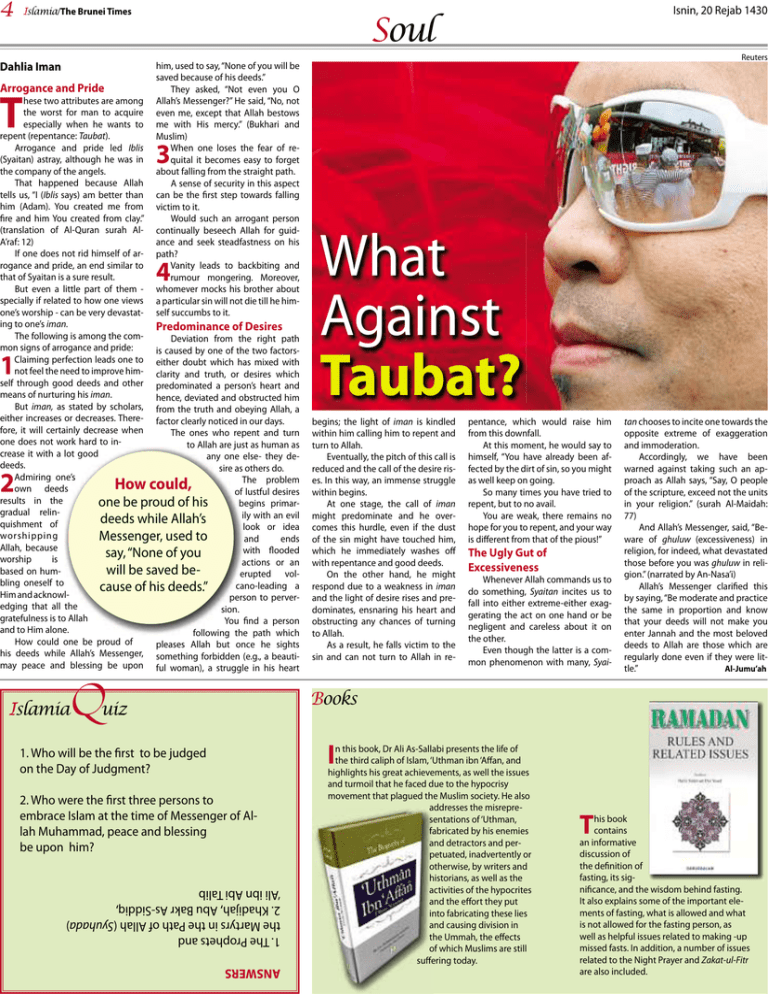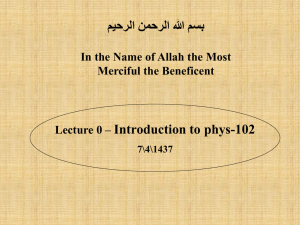What Against Taubat?
advertisement

4 Islamia/The Brunei Times Dahlia Iman Soul him, used to say, “None of you will be saved because of his deeds.” They asked, “Not even you O Allah’s Messenger?” He said, “No, not even me, except that Allah bestows me with His mercy.” (Bukhari and Muslim) When one loses the fear of requital it becomes easy to forget about falling from the straight path. A sense of security in this aspect can be the first step towards falling victim to it. Would such an arrogant person continually beseech Allah for guidance and seek steadfastness on his path? Vanity leads to backbiting and rumour mongering. Moreover, whomever mocks his brother about a particular sin will not die till he himself succumbs to it. Arrogance and Pride T Isnin, 20 Rejab 1430 hese two attributes are among the worst for man to acquire especially when he wants to repent (repentance: Taubat). Arrogance and pride led Iblis (Syaitan) astray, although he was in the company of the angels. That happened because Allah tells us, “I (Iblis says) am better than him (Adam). You created me from fire and him You created from clay.” (translation of Al-Quran surah AlA’raf: 12) If one does not rid himself of arrogance and pride, an end similar to that of Syaitan is a sure result. But even a little part of them specially if related to how one views one’s worship - can be very devastating to one’s iman. Predominance of Desires The following is among the comDeviation from the right path mon signs of arrogance and pride: is caused by one of the two factorsClaiming perfection leads one to either doubt which has mixed with not feel the need to improve him- clarity and truth, or desires which self through good deeds and other predominated a person’s heart and means of nurturing his iman. hence, deviated and obstructed him But iman, as stated by scholars, from the truth and obeying Allah, a either increases or decreases. There- factor clearly noticed in our days. fore, it will certainly decrease when The ones who repent and turn one does not work hard to into Allah are just as human as crease it with a lot good any one else- they dedeeds. sire as others do. Admiring one’s The problem own deeds of lustful desires results in the one be proud of his begins primargradual relinily with an evil deeds while Allah’s quishment of look or idea worshipping Messenger, used to and ends Allah, because with flooded say, “None of you worship is actions or an based on humwill be saved beerupted volbling oneself to cano-leading a cause of his deeds.” Him and acknowlperson to perveredging that all the sion. gratefulness is to Allah You find a person and to Him alone. following the path which How could one be proud of pleases Allah but once he sights his deeds while Allah’s Messenger, something forbidden (e.g., a beautimay peace and blessing be upon ful woman), a struggle in his heart Reuters 3 4 1 2 How could, Q Islamia What Against Taubat? begins; the light of iman is kindled within him calling him to repent and turn to Allah. Eventually, the pitch of this call is reduced and the call of the desire rises. In this way, an immense struggle within begins. At one stage, the call of iman might predominate and he overcomes this hurdle, even if the dust of the sin might have touched him, which he immediately washes off with repentance and good deeds. On the other hand, he might respond due to a weakness in iman and the light of desire rises and predominates, ensnaring his heart and obstructing any chances of turning to Allah. As a result, he falls victim to the sin and can not turn to Allah in re- pentance, which would raise him from this downfall. At this moment, he would say to himself, “You have already been affected by the dirt of sin, so you might as well keep on going. So many times you have tried to repent, but to no avail. You are weak, there remains no hope for you to repent, and your way is different from that of the pious!” The Ugly Gut of Excessiveness Whenever Allah commands us to do something, Syaitan incites us to fall into either extreme-either exaggerating the act on one hand or be negligent and careless about it on the other. Even though the latter is a common phenomenon with many, Syai- tan chooses to incite one towards the opposite extreme of exaggeration and immoderation. Accordingly, we have been warned against taking such an approach as Allah says, “Say, O people of the scripture, exceed not the units in your religion.” (surah Al-Maidah: 77) And Allah’s Messenger, said, “Beware of ghuluw (excessiveness) in religion, for indeed, what devastated those before you was ghuluw in religion.” (narrated by An-Nasa’i) Allah’s Messenger clarified this by saying, “Be moderate and practice the same in proportion and know that your deeds will not make you enter Jannah and the most beloved deeds to Allah are those which are regularly done even if they were little.” Al-Jumu’ah Books uiz I 1. Who will be the first to be judged on the Day of Judgment? 2. Who were the first three persons to embrace Islam at the time of Messenger of Allah Muhammad, peace and blessing be upon him? n this book, Dr Ali As-Sallabi presents the life of the third caliph of Islam, ‘Uthman ibn ‘Affan, and highlights his great achievements, as well the issues and turmoil that he faced due to the hypocrisy movement that plagued the Muslim society. He also addresses the misrepresentations of ‘Uthman, fabricated by his enemies and detractors and perpetuated, inadvertently or otherwise, by writers and historians, as well as the activities of the hypocrites and the effort they put into fabricating these lies and causing division in the Ummah, the effects of which Muslims are still suffering today. T his book contains an informative discussion of the definition of fasting, its significance, and the wisdom behind fasting. It also explains some of the important elements of fasting, what is allowed and what is not allowed for the fasting person, as well as helpful issues related to making -up missed fasts. In addition, a number of issues related to the Night Prayer and Zakat-ul-Fitr are also included. 1. The Prophets and the Martyrs in the Path of Allah (Syuhada) 2. Khadijah, Abu Bakr As-Siddiq, ‘Ali ibn Abi Talib ANSWERS





